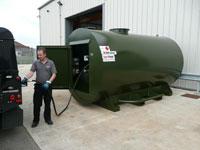Keep your fleet fully fuelled this winter
16 February 2012
The recent extreme cold weather has caused widespread problems for everyone so far this winter, but the haulage industry has been hit particularly hard.
 Heavy snow and ice have caused havoc with delivery schedules, with accidents, road closures and breakdowns taking their toll and stretching transport operators to the limit.
Heavy snow and ice have caused havoc with delivery schedules, with accidents, road closures and breakdowns taking their toll and stretching transport operators to the limit.But it’s not just on the road where operators have been affected; on-site maintenance staff have had an extremely hard job keeping their vehicles up-and-running – and this has certainly been the case when it comes to vehicle refuelling and fuel storage.
In addition to the arctic weather conditions, the changeover to a new diesel specification which began back in November has given fuel users another headache to contend with, as the combination of low temperatures and biofuel in the diesel increases the possibility of problems in vehicle fuel systems and filters. The same problems can also arise with the filters and pumping equipment on bulk storage tanks.
The changeover to fuel specification in line with EU Directive 2009/30/EC means that ‘gas oil’ (red diesel) will become almost sulphur free, and may also contain up to 7% Biodiesel. This low sulphur red diesel containing Biodiesel is a better solvent than current diesel and it will loosen deposits that have built up. If not correctly filtered this can end up blocking vehicle filters and possibly cause damage to engines. Storage tank filters and vehicle fuel filters now containing the loosened deposits should be replaced soon after the change over, and spare filters stocked. The filters may need changing several times over the first few months, depending on the age and condition of the tank.
It is also worth considering having a full internal tank clean to remove build up of:
- Condensation & water from the tank sump
- Sediment & dirt from the tank sump and walls
- Possible bacterial growth
This should be carried out by a company with specialist equipment and the necessary training and expertise. This is also a good opportunity to have the rest of your fuel delivery system checked over, as they will be able to advise on improvements such as filter upgrades, overfill limiting devices, tank and bund alarms, fuel level monitoring systems and fuel management software, as well as more basic pumps, meters, hoses, reels and refuelling triggers.
Low sulphur gas oil also has the effect of making delivery hoses become rigid, and can cause seals to weep. Check that hoses and triggers are in good condition, and replace any that are old as there is a good chance that they will not be compatible with the new fuel. Water in tanks provides the breeding ground for bacterial growth, as well as being able to form ice crystals when the temperature is below 0°C, so good housekeeping of fuel stocks (frequent checking & draining of water etc.) is required to keep your system reliable.
The shelf life of this new fuel is also considerably less as it is more prone to oxidation, which as before, may lead to filter blockages. Fuel stocks should be turned over ideally no longer than 6 months. Find out when your fuel supplier changes from ‘summer’ to ‘winter’ grade fuel (usually at the end of October) and make sure you don’t end up with a tank full of ‘summer’ grade for the winter, as this will ‘wax’ if the temperature drops too low. Avoid positioning tanks in exposed areas if possible, and make sure pipework and pumps are sheltered to reduce heat loss and waxing. Remember that an old partially blocked filter will be less tolerant to small amounts of wax crystals. A large, high capacity fuel filter fitted to your fuel delivery/storage system will mean fewer problems will occur further down the line, so consider fitting one or upgrading.
By taking a proactive approach to their fuel tank maintenance, companies not only prevent these potential problems from arising but can also make significant improvements to their whole refueling operation, reducing vehicle and equipment downtime and repair costs, and also maximizing their profits by ensuring their vehicles are always ‘fully fuelled’.
Other Press Releases By This Company
- 12/09/2019 - What is AdBlue, how does it improve the environment?
- 05/04/2019 - Does your Diesel Bowser meet industry standards?
- 22/03/2019 - A 'Fuel Proof' Partnership for Gulf Aviation
- 08/01/2019 - Fuel Proof launch new bulk fuel tank range
- 16/04/2012 - Keep your business moving
- 16/04/2012 - Keeping up with demand
- 16/04/2012 - New specification diesel an added challenge for hauliers
- 16/04/2012 - Taking fuel control
- 16/02/2012 - Taking fuel control
- 09/02/2011 - New specification diesel an added challenge for hauliers




